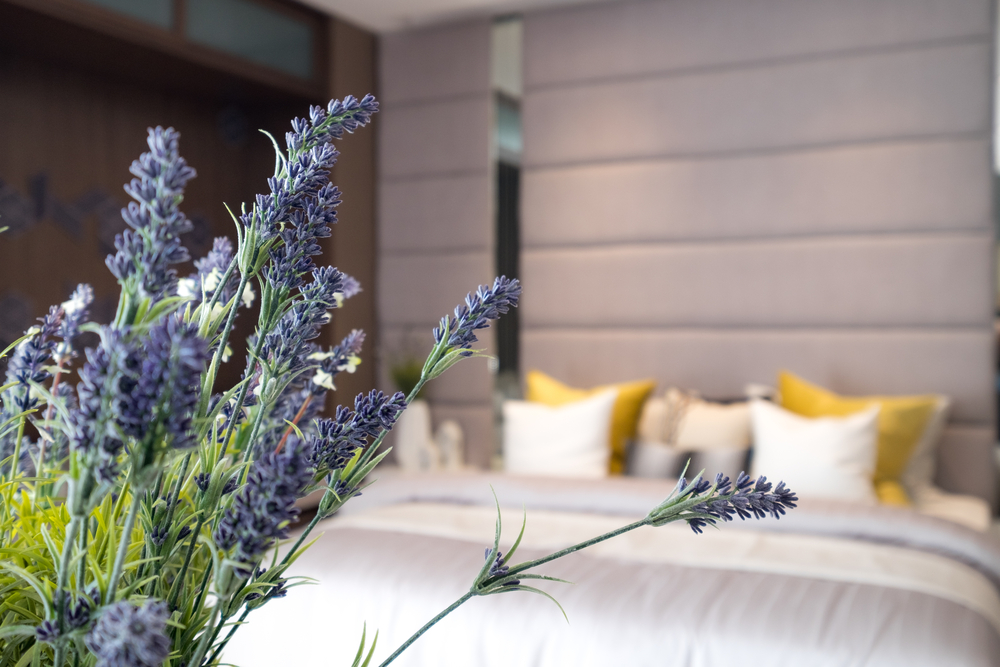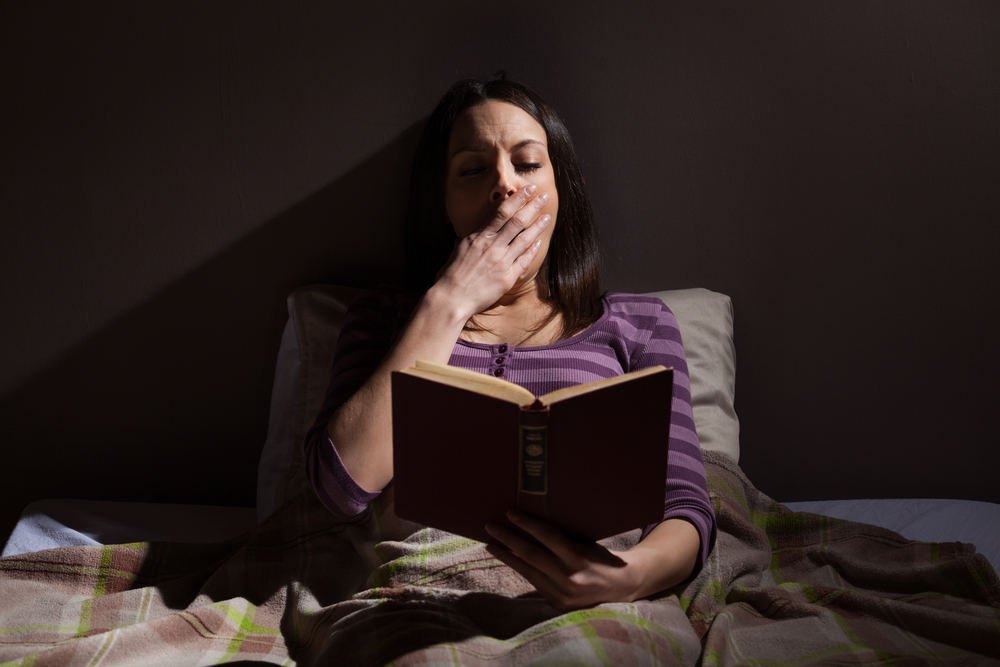Bedtime shouldn’t be stressful. Yet many men and women toss and turn from the moment they attempt to snooze. If you’re dreaming of dozing off faster, there’s hope! We’ve compiled a list of the top 23 ways to fall asleep fast. Note: Some of these tips might surprise you!
1. Set a Regular Bedtime
Adults need 7 to 9 hours of sleep, on average, for optimal mental and physical health. Establishing a regular bedtime—and sticking to it—will train the mind and body that it’s time for sleep.
Why it works: Our natural circadian rhythms ebb and flow over a 24-hour period, making us feel more alert or tired throughout the day. When we work with those rhythms, sleep comes more easily.
2. Start a Bedtime Ritual
Kicking off your bedtime routine with a warm bath or shower, and powering down all electronic devices, allows the brain and body to transition into sleep mode. Nighttime rituals might include changing into pajamas, brushing your teeth, turning on your bedside lamp; these habits—no matter how small—lead to a sleepier you.
Why it works: A bedtime ritual without digital devices is key. Studies show that light-emitting electronics prolong the time it takes to drift off. Even worse, devices affect circadian rhythms, suppress sleep-promoting melatonin, impact REM sleep, and cause grogginess the next morning. Power down to get better sleep and wake up refreshed.
3. Keep Your Room Cool
It might seem like a warm, cozy bedroom will lead to a restful night’s sleep but, believe it or not, comfy and cool is the way to go, especially if you’re struggling to snooze.
According to healthline.com, a temperature of 60-70 degrees Fahrenheit is ideal for falling asleep fast.
Why it works: During sleep, the body’s internal thermostat shifts, and the body’s core temperature dips. However, the temperature of the hands and feet rises.
Tip: Speed up the process by taking a warm bath or pulling on a pair of warm socks.
4. Ditch the Night Light
Just as sunlight promotes alertness, darkness stimulates sleepiness. Keeping your bedroom as dark as possible can help you drift off to dreamland faster.
Why it works: Darkness encourages a rise in the body’s melatonin level—a naturally-occurring hormone needed for adequate sleep. In addition, light exposure throws off circadian rhythms—and your ability to snooze. Darkness, on the other hand, signals the body to go into sleep mode.
5. While You’re At It, Ditch the Clock
Have a clock in your bedroom? It might be adding to your nighttime stress. Checking the clock repeatedly throughout the night, or counting the hours until the alarm goes off, isn’t exactly comforting. Up your chances of falling asleep quickly by hiding any clocks.
Why it works: When stress settles in, the body’s nervous system is in high gear. It’s virtually impossible to fall asleep when the system is in fight or flight mode. Lessen stress—and insomnia—by keeping a clock-free space.
6. Practice 4-7-8 Breathing
Dr. Andrew Weil swears by the 4-7-8 breathing method. To try it, simply press your tongue against the back of your top teeth, exhale completely making a whoosh sound, then focus on breathing in through your nose while mentally counting to four, hold your breath for seven counts. Finally, breathe out completely through the mouth while mentally counting to eight. Practice this exercise four times consecutively to lull yourself to sleep.
Why it works: The 4-7-8 method promotes rest and relaxation by increasing oxygen in the bloodstream, expelling carbon dioxide from the lungs, and slowing the heart rate.
Tip: The 4-7-8 method isn’t just for sleep; it’s also ideal for those unavoidable stressful moments during the day.
7. Turn on Relaxing Music
Music is the ultimate self-soother. Studies show that winding down with slow tunes promotes relaxation. Stick to classical music, or songs that have a rhythm of 60 to 80 beats per minute, for best results.
Why it works: Just as music can be uplifting and energizing, it has the ability to calm you.
Bonus: In addition to aiding sleep, listening to slow music can ward off depression, according to recent research.
8. Just Say No to Caffeine
Regularly enjoy a late afternoon cup of coffee or a carbonated soda with dinner? Opt for decaf, or these beverages could keep you up at night. Many folks who quit caffeine early in the day are better nighttime sleepers.
Why it works: Caffeine is a stimulant and blocks sleep-promoting chemicals in the brain, according to sleep.org. The site explains that it takes six full hours to process just half of the caffeine we consume. So at bedtime, that mid-afternoon energy drink is still at work in the body.
9. Try This Mantra
Meditation and other relaxation techniques have proven effective for falling asleep faster. Mantras are quick and easy—and literally anyone can use them.
Sleep expert Dr. Rubin Naiman encourages people to picture themselves on a peaceful beach in the place between sleep and wakefulness. If sleep doesn’t come quickly, he suggests focusing on the pull of gravity and the sensation of sinking into the bed. If all else fails, repeat the following mantra while thinking of the true meaning of the words: “I am drifting off to sleep. I am drifting off to sleep.”
Why it works: Words are powerful, and repeating Dr. Naiman’s mantra might just convince you to snooze. As he also mentions, the sheer monotony of the phrase might just send you to dreamland.
10. Try a “Brain Dump”
If you keep a mental to-do list or tend to worry endlessly, jot down everything that’s building up in your mind. Keep a notebook close by for a nightly brain dump. The next morning, peruse your list to see if there are to-do items you need to tackle or worries you can cross off.
Why it works: Writing down any building worries and to-do’s allows the mind to let go of unnecessary clutter, and rest peacefully.
11. Practice Acupressure
Sleep.org recommends trying these acupressure tips to fall asleep quickly. “Press your thumb into the spot at the top of your nose between your eyebrows for about 20 seconds. Then, move to your feet: Press on the indent between your big toe and second toe.”
Why it works: Acupressure is soothing; it calms the mind and stimulates sleep.
Bonus: Manipulating acupressure points can help chronic health problems, including sleep apnea, depression, irritability, and respiratory problems, according to modernreflexology.com.
12. Don’t Force It
Trying desperately to fall asleep can cause anxiety and insomnia. If you’ve tried and failed to snooze, try getting out of bed and taking part in a distracting activity, such as reading, a craft, or drinking a warm cup of tea. Avoid powering on digital devices, including the TV.
Why it works: Distraction can work wonders when insomnia pays us a visit. Leaving the bedroom resets the mind and shifts pesky anxious energy.
13. Fill Your Room with the Scent of Lavender
Make part of your bedtime routine filling your bedroom with the soothing scent of lavender. Whether it’s a relaxing pillow spray or essential oil in a diffuser, lavender can help calm the nerves and encourages deeper sleep.
Why it works: Lavender helps to clear the mind, especially for folks who respond well to scents, according to a Wesleyan University study.
14. Go To Your Favorite Place… In Your Mind
Simply visualizing yourself in your favorite environment can relax your mind and body. Does a mountaintop view or a seaside town give you a sense of calm? If so, picture yourself there as you drift off tonight.
Why it works: Envisioning a picturesque, calming place is a welcome distraction for insomniacs. According to an Oxford University study, folks who are told to practice this technique fall asleep faster than those who are told to count sheep or do nothing while trying to fall asleep.
15. Dunk Your Face in Water
It might seem counterproductive, but immersing your face in cold water before bed can lead to a restful night. The refreshing blast will have a calming effect, allowing your mind and body to let go of unnecessary stress.
Why it works: Dunking the face in cold water sets off the Mammalian Dive Response—reflexes that naturally occur when the face is cooled. This blast of cold water resets the mind and makes for a pleasant night’s sleep.
16. Practice Mindfulness
If you’ve heard the old saying, “Yesterday is history, tomorrow is a mystery, today is a present,” you’re probably aware of mindfulness. Implementing this practice at bedtime is particularly helpful for people who struggle to sleep due to anxious thoughts and worries.
Why it works: Being mindful allows you to focus on the here and now, keeping unwanted thoughts and uncertainties at bay. Focusing on sounds, smells, and how your body feels in your bed is a good place to start if you’re eager to begin a nighttime mindfulness practice.
17. Watch the Carbs
Healthline.com notes the detrimental effects a high-carb meal can have on sleep. Thankfully, you don’t have to choose between your favorite comfort foods and a restful night… simply eat carb-heavy foods at least four hours before bedtime.
Why it works: Carbs can decrease sleep quality, as the body is working hard behind the scenes to digest your last meal or snack. After the digestion process, your body is able to focus on rest and recuperation.
18. Get Regular Exercise
Exercise can decrease stress, increase serotonin in the brain, and promote sleep. Morning exercise is especially helpful, as it boosts energy throughout the day before we become naturally tired at night.
Why it works: Movement boosts serotonin levels and decreases stress-provoking cortisol.
Tip: Moderate exercise is best; high exertion can have the opposite effect.
Bonus: Exercise staves of depression, according to multiple studies.
19. Upgrade Your Mattress and Bedding
What you’re sleeping on could be having a major impact on your sleep quality. Splurging on a comfy new mattress, pillows, and bedding could help you fall asleep faster, sleep more soundly, and wake up feeling rejuvenated.
Why it works: If your bed is uncomfortable, lumpy, or not a good fit, there’s a good chance your sleep is suffering. Customizing your mattress, pillows, and bedding to fit your needs can greatly improve your sleep.
Tip: For folks who struggle to sleep on a regular basis, adding a weighted blanket can lower stress and lead to a good night’s sleep.
20. Sleep on Your Side
Your sleep position could actually affect your quality of sleep. Transition to being a side sleeper, and you might just fall asleep faster and feel more rested in the morning.
Why it works: Back sleepers often suffer with blocked airways and sleep apnea—not to mention snoring. Sleeping on the side tends to alleviate many problems associated with back sleeping.
Tip: Check out my article on the best pillows for side sleepers.
21. Enjoy a Relaxing Activity
Reading, drawing, coloring, or picking up a craft to wind down beats sleep-sapping electronics every time. Opt for physical books; as previously mentioned, the blue light emitted from electronics can wreak havoc on sleep.
Why it works: Taking part in an enjoyable activity before bed relaxes the mind and body, making it easier to drift off to dreamland.
22. Suggest Supplements
It’s important to contact your doctor if insomnia is negatively impacting your life. In many cases, supplements are helpful for falling—and staying—asleep.
Why they work: Melatonin—a natural sleep aid—regulates sleep cycles, while magnesium can help folks who are lacking an adequate amount in the body.
23. Think Beyond Insomnia
Your sleep issues may be the result of a coexisting underlying health condition. Contact a healthcare professional if you are struggling with ongoing insomnia.
There are many reasons men and women have difficulty sleeping, but the above tips and tricks could quite possibly help you fall asleep fast and remind you how restorative a good night’s rest can be.
Resources:
http://www.pnas.org/content/112/4/1232
https://www.healthline.com/nutrition/ways-to-fall-asleep#section2
https://www.ncbi.nlm.nih.gov/pubmed/24851405
https://www.drweil.com/videos-features/videos/the-4-7-8-breath-health-benefits-demonstration/
https://sleep.org/articles/how-to-fall-asleep/
http://www.modernreflexology.com/acupressure-points-for-sleeping-disorders/
https://www.huffingtonpost.com/entry/15-ways-to-fall-asleep-faster_us_55dde3e7e4b04ae497054470
https://www.ncbi.nlm.nih.gov/pubmed/11863237
https://www.breatheology.com/2014/03/19/mammalian-dive-response/
https://www.healthline.com/nutrition/ways-to-fall-asleep#section8
https://www.ncbi.nlm.nih.gov/pubmed/25328886




